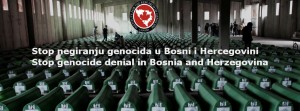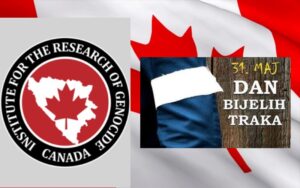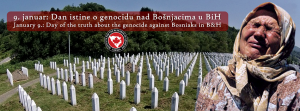Bosniak NGOs ask Croatian president to take action against his adviser Dejan Jovic, who denies that genocide was committed against Bosniaks the 1992-1995 war in Bosnia and Herzegovina and downplays the responsibility of the Serbian policy of territorial expansion for the war in the former Yugoslavia.
In his book entitled “First Do No Harm: Humanitarian Intervention and the Destruction of Yugoslavia” David Gibbs openly denies that genocide was committed against Bosniaks in the Srebrenica area of eastern Bosnia in 1995, quoting him as saying that the Bosnian authorities shelled their own citizens in besieged Sarajevo.
Portraying Gibbs as “a neo-communist proponent of conspiracy theories who regards Slobodan Milosevic as a champion against NATO expansion and not as a butcher of the Balkans responsible for the deaths of thousands and persecution of millions of people in the former Yugoslavia,” the signatories of the letter said Croatian presidential adviser Jovic wrote a “totally uncritical review” of the book, praising it for challenging the conventional interpretations of the war.
“Dejan Jovic is not quite sure either about who was defending themselves in the Homeland War in Croatia and who the attackers were, as can be seen in his book ‘Yugoslavia – A State That Withered Away’,” the letter said, adding that the fact that such a person “sits in the Office of the Croatian President directly affects the international reputation of Croatia.”
The signatory organisations said that they would notify “all their friends in the world” of this and asked the President of Croatia to state his position on Jovic’s views and to “take appropriate steps”.
More: The letter to the President of the Republic of Croatia
Dejan Jovic, Prometej, Zagreb, 2003
Describes Chetniks as a ‘strong, pro-Yugoslav resistance movement’
Describes Milosevic as fighter against ‘anti-state ideology and anarchy’
Says West supported Bosniaks and Albanians against Serbs:
Compares Britain’s successful intervention in Northern Ireland with JNA’s inability to do the same in Yugoslavia:
Describes Milosevic as a ‘Yugoslav nationalist’
Describes Milosevic as loyal to Tito’s legacy:
Says Milosevic, at time of 8th Session in 1987, aimed to unify Serbia and Yugoslavia:
Credits Milosevic with trying to restrain Serbian nationalism:
Implies Milosevic was ‘genuinely surprised’ by collapse of Yugoslavia and war
Describes JNA’s intervention in Croatia as ‘well-intentioned’
Describes JNA as being ‘dragged into’ war
Describes war as result of state collapse and unplanned, private violence
Some quotations from Gibbs’s book, giving an indication of the sort of book it is. Jovic is continuing to praise the book on Reuf’s Facebook wall.
Gibbs, p. 111: ‘There is no question that the Serb leadership contained several dubious figures, some of whom would later orchestrate serious war crimes. In March 1992, however, before full-scale war had begun, Serb leaders welcomed the Lisbon agreement and they endorsed it in the strongest terms. Radovan Karadzic, who represented the Serbs at Lisbon, called the agreement a “great day for Bosnia and Herzegovina.” And it should be recalled that it was the Muslims and the Croats, not the Serbs, who actually reneged. There is no evidence that the Serbs were bent on war at this point.’
Gibbs, p. 116: ‘The emergence of a Muslim/Croat political alliance, beginning in 1990, was basically a marriage of convenience, since the two groups were culturally distinct. The alliance was based on the suspicion that both groups felt toward the Serbs, who formed the largest ethnic bloc in the Yugoslav federation. In addition, the Muslim/Croat alliance of 1990-1991 recreated a similar alliance that had existed during World War II, when the two groups were the main supporters of the pro-Nazi Ustasa state, and both participated in the massacres of the Serbs that occurred during this period. Given the historic associations, it is natural that Bosnia’s Serbs viewed this ethnic collaboration with apprehension.’
Gibbs, p. 124: ‘It is clear that Serb forces were on the offensive during much of the war, and they conquered large areas of Bosnia-Herzegovina. But the extent of Serb aggression was once again exaggerated. Newspaper articles repeatedly noted that Serbs controlled some 70 percent of Bosnia’s territory, despite the fact that they only constituted 31 percent the [sic] total population. There was an insinuation that the Serbs must have conquered most of the 70 percent. Why, the reader might wonder, should the Serbs control so much land if they account for less than one-third of the population ? What such reports omitted was that Serbs had always occupied most of Bosnia’s land area, owing to their demographic dominance in rural regions.’
Gibbs, p. 125: ‘In several cases, Bosnian forces themselves bombarded Sarajevo and blamed the resulting deaths on the Serbs.’
Gibbs, p. 126: ‘In should also be noted that the [Bosnian] government restricted the right of Sarajevo residents to flee the city, effectively blocking the exit for many besieged civilians. This policy increased the potential for casualties and fit in nicely with the government’s public relations strategy. In the world’s media, the deaths from shelling and sniper fire were blamed exclusively on Serb forces, but in reality the Bosnian government bore some responsibility as well.’
Gibbs, pp. 153-154: ‘The Srebrenica safe area had an especially brutal history, and it was besieged by Serb forces throughout the war. It is important to note, however, that Muslim troops also behaved brutally. Especially problematic was the Muslim commander Brigadier Oric, who based his forces inside Srebrenica and conducted forays against Serb villages in the surrounding region. One UNPROFOR commander later described Oric’s activities as follows: “Oric engaged in attacks during Orthodox holidays and destroyed [Serb] villages, massacring all the inhabitants. This created a degree of hatred that was quite extraordinary in the [Srebrenica] region.”‘
Gibbs, p. 160: ‘The origin of the Srebrenica massacre lay in a series of Muslim attacks that began in the spring of 1995. These attacks were launched from UN-protected safe areas, including the one in Srebrenica. According to the Dutch investigation of the massacre: “The UN headquarters in Zagreb had. concluded that the Bosnian Muslims continually misused the safe areas to maintain their armed forces, while in some cases it looked as if they intended to provoke shelling by the Bosnian Serbs.” Such actions invited Serb reprisals, and this dynamic contributed to the fall of the safe area.’
Gibbs, p. 216: ‘Another feature of the Balkan conflict was the tendency of the Western media needlessly to exaggerate the atrocities committed by Serb armies.’
Gibbs, p. 216: ‘Atrocities committed at Serb-run detention camps were presented in sensationalist fashion, for example, and they became “extermination camps” comparable to Auschwitz. President Izetbegovic himself encouraged these interpretations. Yet, in 2003, shortly before his death, Izetbegovic conceded that “there were no extermination camps” in Bosnia. He also conceded that his previous claims to the contrary had been deliberate misrepresentations, intended to outrage Western public opinion and thus trigger Western military intervention against the Serbs.’
Gibbs, p. 281: ‘Certainly, the murder of eight thousand people [at Srebrenica] is a grave crime, but to call it “genocide” needlessly exaggerates the scale of the crime.’
Dejan Jovic, chief analyst and special coordinator to Croatian President Ivo Josipovic, has written an uncritical and glowing review of David Gibbs’s book, ‘First do no Harm’, which you can read here:
http://hrcak.srce.hr/index.php?show=clanak&id_clanak_jezik=158678
http://dgibbs.faculty.arizona.edu/sites/dgibbs.faculty.arizona.edu/files/CroatianReview-pdf.pdf
Gibbs’s book explicitly denies the Srebrenica genocide; blames the Bosniaks for provoking the massacre; accuses the Bosnian army of shelling its own civilians in besieged Sarajevo in order to blame it on the Serbs; and regurgitates the Serb-natioanalist conspiracy theory, whereby Yugoslavia was destroyed and Milosevic’s Serbia victimised by evil Western imperialist powers.
Dr Marko Attila HoareFaculty of Arts and Social Sciences, Kingston University, London and Member of the International Expert Team of the Institute for Research of Genocide, Canada
This means that we have a praiser of Srebrenica genocide denial and Serb-nationalist conspiracy theory formulating the Croatian president’s policy toward Bosnia !Jovic’s book about the break-up of Yugoslavia also defends the pre-1990 Milosevic, describing him as a ‘Yugoslav nationalist’.



